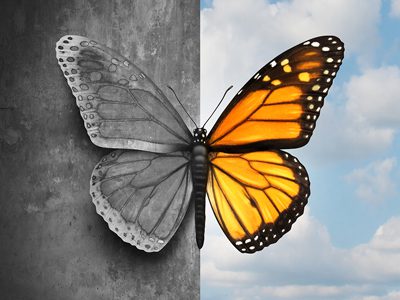 Mood disorders are a class of mental health concerns.
Mood disorders are a class of mental health concerns.
They include several types of depression, as well as bipolar disorder. These are disorders that affect a person’s emotions.
Adults, teens and even children can develop a mood disorder. Mood disorders are challenging for practitioners to diagnose in young people, since the symptoms can look different from those experienced by adults. Children may not always be able to express how they feel accurately to a professional, which also makes it difficult to make a correct diagnosis.
Types of Mood Disorders
The most common types of mood disorders are as follows:
- Major Depression
- Dysthymia
- Bipolar Disorder
Mood disorders can also exist in tandem with other health conditions. It’s not uncommon for patients who develop cancer, chronic pain or illnesses, or who experience severe injuries or infections to become depressed.
Drug or alcohol abuse, medication use or exposure to toxins can lead to substance-induced mood disorder.
Major Depression is one of the most common mental health concerns in the US and worldwide. It has been referred to as “the common cold of mental illness.”
In 2015, 6.7 percent of adults in the U.S. had at least one episode of depression, which equals 16.1 million people (National Survey on Drug Use and Health). A major depressive episode lasts a minimum of two weeks; during this time, the affected person experiences loss of interest in everyday life or things that previously brought pleasure. Along with these symptoms, there are multiple changes in functioning, such as issues with eating, sleeping, focusing/concentrating and self-image.
Dysthymia is a chronic, low-level depression. To make this diagnosis, a clinician must be able to document that a patient has been experiencing symptoms for a minimum of two years. This condition affects approximately 1.5 percent of the American adults.
Bipolar Disorder is also called manic-depression. This mood disorder is characterized by major shifts in energy levels, mood and activity levels, with periods of normal moods in between. The shifts between “highs” and “lows” are significant enough to affect the person’s ability to function effectively on a day-to-day basis and are much more severe than normal shifts in mood that normally occur. About 2.6 percent of the adult population in the US lives with bipolar disorder.
Symptoms of Mood Disorders
Symptoms of mood disorders vary, depending on the person. As stated above, these symptoms are ongoing and severe; they are more than just someone having a bad day.
Symptoms of Depression. A depressed person may experience some or many of the following symptoms:
- Low energy
- Guilty, inadequate or hopeless feelings
- Difficulty getting to sleep or staying asleep
- Feeling “sluggish”
- Changes in appetite or weight
- Sleeping too much
- Lack of energy
- Difficulty concentrating
- Trouble making decisions
- Inability to experience pleasure
- Irritability
- Sensitivity to rejection or failure (real or perceived)
- Headaches or other physical complaints that don’t respond to treatment
- Thoughts about death or suicide
Symptoms of Mania. A person who is living with manic-depression and is in the “high” or manic phase of the disorder will likely have a lot of energy. He or she may be unusually animated or creative. Other symptoms include:
- Feeling unusually optimistic
- Extreme irritability
- Little need for sleep
- Racing thoughts; moving quickly from one idea to the next
- Difficulty concentrating
- Easily distracted
- May have unrealistic, overly ambitious ideas about goal-setting
Some people in this state may engage in reckless behavior without considering the consequences of their actions. They may become involved in risky sexual activity, make bad investment choices, spend money recklessly or make other decisions that are not well thought out.
Diagnosis and Treatment of Mood Disorders
If you notice symptoms of a mood disorder in yourself or a loved one, the first step in getting help is to make an appointment with a primary care physician. You or your loved one may need to see a specialist to get a full evaluation and diagnosis.
Mood disorders are treated with medication, psychotherapy or a combination of the two. Anti-depressant or other mood stabilizing medications are prescribed. These should not be confused with drugs that produce a feeling of euphoria. Anti-depressants take several weeks to work at full strength.
A number of people who have been diagnosed with depression find that cognitive-behavioral therapy is helpful; this therapy focuses on changing a person’s thoughts first, with the idea that changes in behavior will follow. Someone in this type of therapy is taught to identify negative thoughts and assumptions and replace them with more realistic, positive ones.
Mood Disorders and Substance Abuse
Since mood disorders have the potential to affect a person’s quality of life, it’s not uncommon for a person experiencing symptoms to self-medicate with drugs and/or alcohol. They may not associate their feelings with a mood disorder at first, may not know how to get help, or could be embarrassed or ashamed to access mental health services.
Medical professionals are familiar with mood disorders and will provide help in a caring, non-judgmental manner. If you are looking for help for someone with a dual diagnosis (addiction and a mood disorder), the staff at Great Oaks Recovery has the experience, caring and understanding you are looking for.
If you or someone you love is in need of alcohol or drug treatment, contact us anytime at (713) 769-0102. We are here to help.
Sources:
Major Depression Among Adults.
Overview of Mood Disorders.
Bipolar Disorder Signs and Symptoms.
Bipolar Disorder Among Adults.
Major Depression Among Adults.


